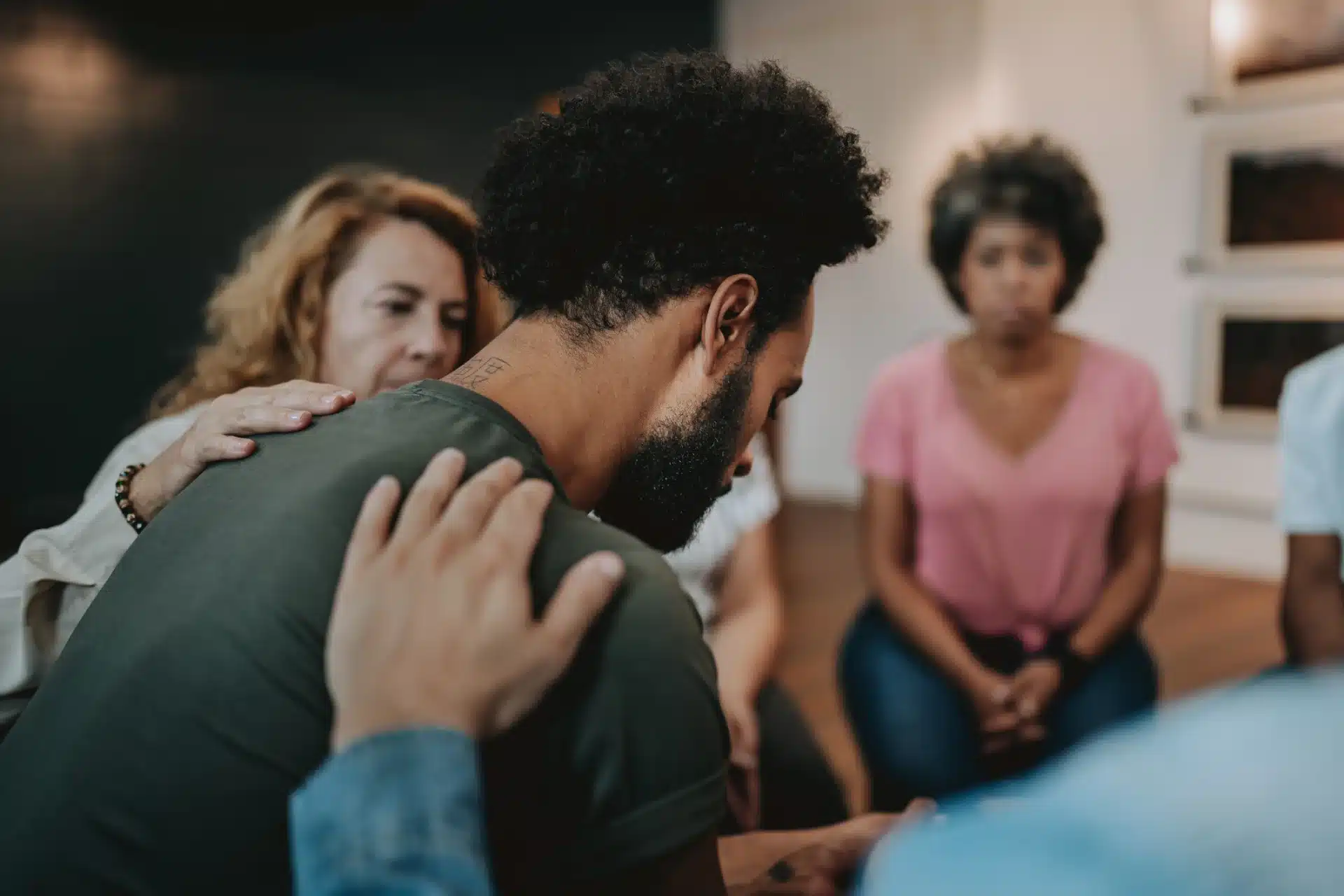
Emotional Trauma Treatment
Start living with greater peace and resilience.
Healing Emotional Trauma in a Safe, Supportive Space
At our emotional trauma treatment centers, we provide a safe and supportive environment to help you heal. Our trauma programs are designed to guide you through processing emotional trauma and rediscovering your sense of self.
Trauma Therapy That Treats the Root Cause
Trauma can stem from a single event or a series of traumatic events that are repeated over a period of time, causing individuals to suffer overwhelming, painful, frightening, or loathing emotions. Experiencing trauma during childhood while the brain is still developing can have severe and long-lasting effects that – if left untreated – can carry over into adulthood. The Meadows is dedicated to treating the root of trauma through therapy, helping individuals achieve lasting recovery and reclaim their lives.
About 6 of every 10 men experience at least one trauma in their lives.
About 5 of every 10 women experience at least one trauma in their lives.
Personalized Emotional Trauma Treatment
We create personalized treatment plans tailored to your unique experience of emotional trauma, using proven strategies that work best for your healing process. Our whole-person approach addresses both the immediate emotional distress and the deeper unresolved pain.

Emotional Trauma Treatment Options
Inpatient Emotional Trauma Treatment
Our inpatient emotional trauma treatment centers provide structured care and daily support, offering a safe space to heal away from daily stressors.
Outpatient Emotional Trauma Treatment
Keep up with your regular life while getting the help you need to overcome co-dependency with flexible sessions that provide strong support.
Intensive Trauma Workshop Sessions
Our 5-day intensive trauma workshops offer in-depth guidance and practical tools. These sessions help you manage the long-term effects of trauma.
Our Inpatient & Residential Emotional Trauma Centers
Our Outpatient Trauma Treatment Center Locations
How We Treat Emotional Trauma
Brain Center
Our Brain Center uses advanced tools to support brain function, essential for processing emotional trauma. These tools help reduce emotional distress and improve your ability to cope with the challenges that arise from unresolved emotional trauma.
TRauma Therapy
Each emotional trauma treatment program includes various therapies that address your unique needs. This comprehensive approach promotes emotional healing and equips you with the confidence to manage trauma-related challenges more effectively.
Meadows Model
Each emotional trauma treatment plan includes various therapies that address your unique needs. This comprehensive approach promotes emotional healing and equips you with the confidence to manage trauma-related challenges more effectively.
What Sets The Meadows Apart for Trauma Therapy and Treatment?
Not all emotional trauma treatment programs are the same. At The Meadows, we take a whole-person approach to care, addressing not only the physiological effects of trauma but also the emotional and psychological patterns that sustain ongoing symptoms.
Expertise in Trauma Treatment
With over 45 years of proven success, our trauma treatment program has a proven track record, having supported more than 20,000 clients and 25,000 workshop participants. Our foundation of clinical excellence was built by Pia Mellody, a pioneer in trauma and recovery, and continues with distinguished Senior Fellows.
Trauma-First Care
At The Meadows, we focus on recovery from trauma, including combat stress, accidents, medical events, abuse, and family-of-origin wounds. Many struggling with emotional trauma have unresolved experiences, which we address through specialized, evidence-based therapies. Learn about our treatment approach.
Dual Diagnosis Treatment
Comprehensive care for co-occurring conditions common with emotional trauma, including anxiety, depression, mood instability, dissociation, and substance use disorders. Our integrated approach treats trauma and addiction together, supporting whole-person recovery. Explore our clinical outcomes.
I highly recommend the Meadows for mental health and trauma treatment. If you are ready to make a change in your life, this is the place to be!
Andrea
MBH Alumni

Traveling for Care?
People from all over choose The Meadows for expert care in trauma, addiction, and mental health, a private environment, and extraordinary recovery outcomes. We ensure every step of your journey is supported so you can focus fully on healing.

Feel Secure and Supported in Your Healing
You can overcome emotional trauma and find peace. We’re here to help you every step of the way. Contact our admissions team to explore the right emotional trauma treatment center for you.
-
Emotional Trauma Treatment FAQs
What are the different kinds of sex addiction?
Sex Addiction can manifest in many forms and affects people in different ways. Common types include:
Sexual Compulsivity
Pornography Addiction
Relationship Addiction
Internet Sex Addiction
Sexual Anorexia
Sex Addiction in Young Adults
Is something wrong with me if I don’t want sex—or want it too much?
Not at all. Sexual desire varies widely between individuals and across different life stages. It can become a concern when it causes distress, impacts relationships, or stems from unresolved emotional or psychological issues. If you are feeling confused or conflicted about your sexual behavior or lack of interest, a member of our team can help. Give us a call at 928.260.3568.
How do I talk to my partner about my trauma or intimacy struggles?
Talking about trauma can feel very vulnerable, but openness can lead to deeper connection and understanding. Choose a calm time to talk, and explain that you want to share something important. Use “I” statements to describe your experiences (e.g., “I sometimes struggle with intimacy because of things from my past”). It’s okay to take things slow and ask for patience and support. If the conversation feels too overwhelming, seeking professional help could be a helpful step.
Can relationships survive sexual trauma or long-term intimacy issues?
Yes, many relationships not only survive but grow stronger through the healing process. With the right support, including treatment and open communication, relationships can work through the effects of trauma. Recovery takes time, but it’s absolutely possible when both partners are committed to understanding and supporting one another.
How can I support a loved one struggling with sex addiction and intimacy issues?
Supporting a loved one struggling with sex addiction and intimacy issues starts with listening and letting them know they are not alone. Educate yourself about what they are going through so you can better understand what they are experiencing. It is essential to prioritize your own well-being so that you can consistently offer compassionate support. Reach out to our team to discuss treatment and what options might be best for your loved one at 928.260.3568.
How can I support a partner who has experienced sexual trauma?
Supporting a partner with sexual trauma — whether from their childhood or as an adult — starts with being a safe, nonjudgmental presence, respecting their boundaries, listening, and avoiding pressuring them physically or emotionally. Encourage them to seek help if they haven’t already, and consider couples workshops or therapy to work through the journey of healing.
What are the common signs and symptoms of someone struggling with sex addiction and intimacy?
Signs and symptoms can vary, but common signs include:
Difficulty maintaining healthy relationships
Preoccupation with sexual thoughts or behaviors
Using sex to cope with stress, shame, or emotional pain
Engaging in risky or secretive behaviors
Feelings of guilt, shame, or powerlessness around sexual behavior
Avoidance of intimacy or emotional closeness
Repeated failed attempts to control or stop the behavior
Where can I find help for healing sexual trauma and improving intimacy?
Healing from sexual trauma and improving intimacy is possible with the right support. There are several levels of treatment, such as inpatient, outpatient, and workshops, that help you achieve recovery. To learn more and discuss what option is best for you or a loved one, give us a call at 928.260.3568.
How do I get started with sex addiction treatment?
The first step in starting treatment at The Meadows for sex addiction and intimacy issues begins with connecting with our team. You can contact our team through our online contact form or by giving us a call at 928.260.3568. We are here to guide you through each step of your healing process and reach lasting recovery.
Does The Meadows provide post-treatment recovery support?
At The Meadows, we know that recovery doesn’t end when treatment concludes. The Meadows offers several options for aftercare, including step-down programs through our outpatient programs with locations across the country offering Partial Hospitalization Programs (PHP), Intensive Outpatient (IOP), and Outpatient (OP). Additionally, we have an experienced Case Management team, and our alumni program, Onward, is open to any individual who has gone through one of our programs. Onward provides individuals with a supportive community committed to ongoing resources and empowerment, knowing that recovery is a lifelong journey.
Does treatment for sex addiction and intimacy include Family Education and/or support?
Family or friend involvement is crucial to the healing process for sex addiction and intimacy issues. In our programs, we offer a variety of resources for family members, including educational and communication tools, as well as, in some cases, onsite workshops. The decision to attend a family program is guided by several factors, including the length of stay, clinical appropriateness, patient desire, and others. Once admitted, our team members will work with the patient and their family to determine the next steps.